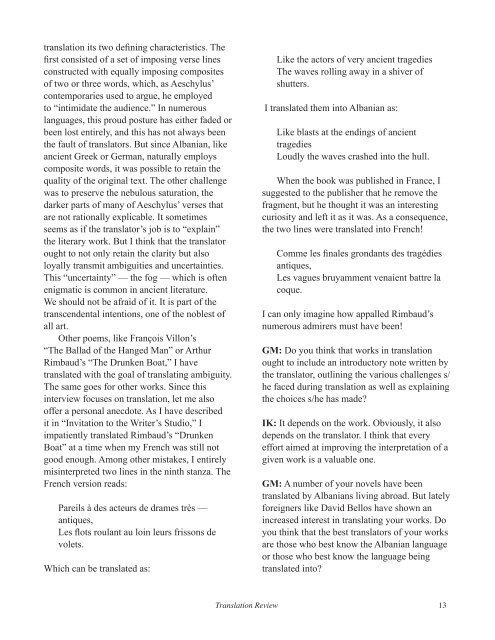Table of contents - The University of Texas at Dallas
Table of contents - The University of Texas at Dallas
Table of contents - The University of Texas at Dallas
Create successful ePaper yourself
Turn your PDF publications into a flip-book with our unique Google optimized e-Paper software.
transl<strong>at</strong>ion its two defining characteristics. <strong>The</strong><br />
first consisted <strong>of</strong> a set <strong>of</strong> imposing verse lines<br />
constructed with equally imposing composites<br />
<strong>of</strong> two or three words, which, as Aeschylus’<br />
contemporaries used to argue, he employed<br />
to “intimid<strong>at</strong>e the audience.” In numerous<br />
languages, this proud posture has either faded or<br />
been lost entirely, and this has not always been<br />
the fault <strong>of</strong> transl<strong>at</strong>ors. But since Albanian, like<br />
ancient Greek or German, n<strong>at</strong>urally employs<br />
composite words, it was possible to retain the<br />
quality <strong>of</strong> the original text. <strong>The</strong> other challenge<br />
was to preserve the nebulous s<strong>at</strong>ur<strong>at</strong>ion, the<br />
darker parts <strong>of</strong> many <strong>of</strong> Aeschylus’ verses th<strong>at</strong><br />
are not r<strong>at</strong>ionally explicable. It sometimes<br />
seems as if the transl<strong>at</strong>or’s job is to “explain”<br />
the literary work. But I think th<strong>at</strong> the transl<strong>at</strong>or<br />
ought to not only retain the clarity but also<br />
loyally transmit ambiguities and uncertainties.<br />
This “uncertainty” — the fog — which is <strong>of</strong>ten<br />
enigm<strong>at</strong>ic is common in ancient liter<strong>at</strong>ure.<br />
We should not be afraid <strong>of</strong> it. It is part <strong>of</strong> the<br />
transcendental intentions, one <strong>of</strong> the noblest <strong>of</strong><br />
all art.<br />
Other poems, like François Villon’s<br />
“<strong>The</strong> Ballad <strong>of</strong> the Hanged Man” or Arthur<br />
Rimbaud’s “<strong>The</strong> Drunken Bo<strong>at</strong>,” I have<br />
transl<strong>at</strong>ed with the goal <strong>of</strong> transl<strong>at</strong>ing ambiguity.<br />
<strong>The</strong> same goes for other works. Since this<br />
interview focuses on transl<strong>at</strong>ion, let me also<br />
<strong>of</strong>fer a personal anecdote. As I have described<br />
it in “Invit<strong>at</strong>ion to the Writer’s Studio,” I<br />
imp<strong>at</strong>iently transl<strong>at</strong>ed Rimbaud’s “Drunken<br />
Bo<strong>at</strong>” <strong>at</strong> a time when my French was still not<br />
good enough. Among other mistakes, I entirely<br />
misinterpreted two lines in the ninth stanza. <strong>The</strong><br />
French version reads:<br />
Pareils à des acteurs de drames très —<br />
antiques,<br />
Les flots roulant au loin leurs frissons de<br />
volets.<br />
Which can be transl<strong>at</strong>ed as:<br />
Like the actors <strong>of</strong> very ancient tragedies<br />
<strong>The</strong> waves rolling away in a shiver <strong>of</strong><br />
shutters.<br />
I transl<strong>at</strong>ed them into Albanian as:<br />
Like blasts <strong>at</strong> the endings <strong>of</strong> ancient<br />
tragedies<br />
Loudly the waves crashed into the hull.<br />
When the book was published in France, I<br />
suggested to the publisher th<strong>at</strong> he remove the<br />
fragment, but he thought it was an interesting<br />
curiosity and left it as it was. As a consequence,<br />
the two lines were transl<strong>at</strong>ed into French!<br />
Comme les finales grondants des tragédies<br />
antiques,<br />
Les vagues bruyamment venaient b<strong>at</strong>tre la<br />
coque.<br />
I can only imagine how appalled Rimbaud’s<br />
numerous admirers must have been!<br />
GM: Do you think th<strong>at</strong> works in transl<strong>at</strong>ion<br />
ought to include an introductory note written by<br />
the transl<strong>at</strong>or, outlining the various challenges s/<br />
he faced during transl<strong>at</strong>ion as well as explaining<br />
the choices s/he has made<br />
IK: It depends on the work. Obviously, it also<br />
depends on the transl<strong>at</strong>or. I think th<strong>at</strong> every<br />
effort aimed <strong>at</strong> improving the interpret<strong>at</strong>ion <strong>of</strong> a<br />
given work is a valuable one.<br />
GM: A number <strong>of</strong> your novels have been<br />
transl<strong>at</strong>ed by Albanians living abroad. But l<strong>at</strong>ely<br />
foreigners like David Bellos have shown an<br />
increased interest in transl<strong>at</strong>ing your works. Do<br />
you think th<strong>at</strong> the best transl<strong>at</strong>ors <strong>of</strong> your works<br />
are those who best know the Albanian language<br />
or those who best know the language being<br />
transl<strong>at</strong>ed into<br />
Transl<strong>at</strong>ion Review 13

















